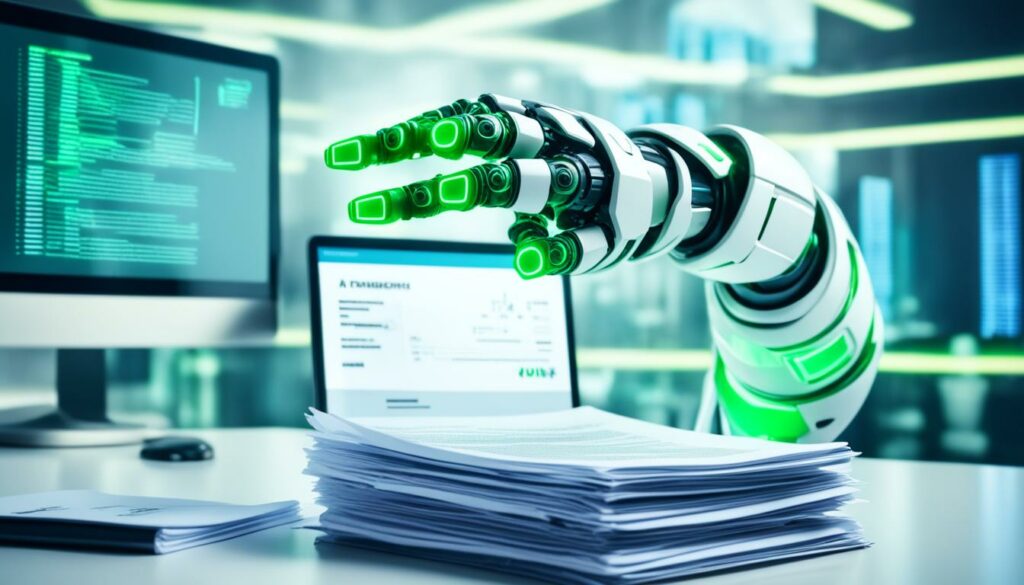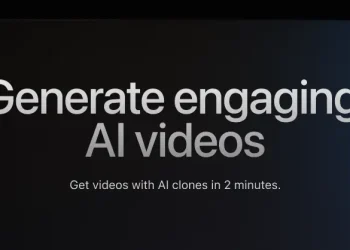Did you know lawyers spend almost 40% of their time on tasks not related to billing, like reviewing documents? This fact shows the urgent need for new ideas in the legal world. The use of AI in reviewing legal documents is changing the game. It cuts down the time spent on manual reviews, makes the process more accurate, and lowers mistakes. This leads to better case results and happier clients.
By using advanced tech like Natural Language Processing (NLP) and machine learning, AI makes handling documents easier. These technologies are changing how legal professionals work. They allow lawyers to spend more time on important tasks and ensure documents are analyzed quickly and correctly. The legal field is changing fast, and not using AI in document review could put you behind.
Key Takeaways
- Lawyers spend a lot of time on tasks that don’t earn them money, which hurts their work efficiency.
- AI document review uses NLP and machine learning for precise analysis.
- Automated data extraction saves many hours of manual review and cuts down on mistakes.
- Intelligent summarization features make complex legal documents easier to understand.
- More law firms are trusting AI systems because they are open and help make decisions.
- AI technology can improve legal research, follow-up on rules, and manage knowledge better.
The Transformation of Legal Practices Through AI
The legal world is changing fast, thanks to AI. Law firms are now using AI to make their work easier, especially with document review and eDiscovery. This shift lets lawyers focus more on strategy and tasks that need human touch.
Using AI for legal documents brings big benefits. Firms get more efficient and save money. AI handles tasks like legal research and document management, cutting down on manual work.
Also, AI tools give deeper insights and help lawyers answer client needs faster. They can go through lots of information quickly. This means lawyers have more time for clients, building better relationships and improving the client experience.
AI is becoming a big part of legal work, showing up in many industries. As firms use these new technologies, they can work better and serve clients better. The rise of AI in law marks a new era of doing things more efficiently and effectively.
The Challenges of Traditional Document Review
Traditional legal document review is hard work. It can take days or even months to go through documents. This takes legal experts away from important tasks, making them less productive. That’s why AI in legal document review is becoming key for today’s legal work.
The Time-Consuming Nature of Manual Review
Legal experts spend a lot of time looking through documents for important info. This slows down their work. Using AI technology in the legal sector can make this faster. AI can look at thousands of documents quickly, giving results much faster than before.
This means AI can cut the costs of checking documents.
The Risk of Human Errors and Oversights
Manual review is not only time-consuming but also prone to mistakes. Small errors in complex legal documents can have big consequences. Many legal pros find they work better with AI tools.
These tools can spot specific parts of documents accurately. They use predictive coding and technology to help with this. AI lowers the chance of missing important details, making legal document review better and more reliable.
Understanding AI in Legal Document Review
AI is changing the game in legal document review. It makes legal teams work better and cuts down on mistakes. This is thanks to AI document review software.
Defining AI Document Review
AI document review uses artificial intelligence to look through legal documents. It goes beyond simple keyword searches with machine learning for law firms. These tools learn legal terms and context, making document analysis faster.
Machine Learning’s Role in Document Analysis
Machine learning is key to making AI document review better. It learns from huge amounts of legal documents. This helps it spot patterns and find unusual things.
Thanks to this, AI technology in the legal sector gets more accurate over time. AI can quickly go through many documents, letting lawyers focus on important tasks.
As AI gets better, it cuts down the time it takes to review documents. It also finds insights that might be missed. This leads to more accurate work and better service for clients.
Benefits of AI Document Review Systems
AI document review systems are changing how lawyers work, bringing big benefits that make things more efficient. They let lawyers work faster, saving a lot of time and cutting costs. This is a big change from old ways of doing things.
Increased Efficiency Across Workflows
AI document review software speeds up the review of documents. Legal teams can look through lots of documents much quicker with automated tools. This means cases move faster and costs go down, making better use of resources.
Improved Accuracy and Reduced Errors
AI for legal documents cuts down on mistakes during reviews. Advanced algorithms quickly spot important info and mark it, making reviews more accurate. By mixing human skills with AI, lawyers get reliable and precise reviews. Generative AI in these systems also helps with summarizing, analyzing, and translating documents, all while keeping accuracy high.

Key Technologies Driving AI in the Legal Sector
AI technology is changing the legal world fast. It’s making legal work easier for professionals. Thanks to Natural Language Processing (NLP) and automated legal analysis, reviewing documents is now faster and more accurate. These tools help lawyers work better and serve their clients more efficiently.
Natural Language Processing (NLP)
NLP is key to understanding human language for machines. It lets lawyers analyze complex documents with ease. AI tools with NLP can quickly go through lots of text, finding important legal points.
Automated Legal Analysis and Data Extraction
Automated legal analysis sorts and picks out important documents fast. This makes legal work quicker and more efficient. By combining this with data extraction, lawyers can find and use key information better, leading to better legal results.
| Technology | Description | Benefits |
|---|---|---|
| Natural Language Processing (NLP) | Enables machines to understand human language, allowing nuanced legal document analysis. | Improves efficiency in document review by rapidly identifying key terms and phrases. |
| Automated Legal Analysis | Systems that categorize and extract relevant information from legal documents. | Enhances accuracy and reduces the time taken for document assessment. |
| Cloud Computing | Facilitates remote data storage and access for legal teams. | Allows for better collaboration and real-time insights on client files. |
These new technologies make lawyers more productive by automating routine tasks. They can now focus on the big picture. By using AI for document review, law firms can offer faster and cheaper services to clients.
How AI in Legal Document Review Works
AI in legal document review uses advanced strategies to change how law firms handle documents. It starts by collecting a lot of electronic data, making sure important info doesn’t get missed. Then, it organizes this data by relevance, making it easier to see what’s most important.
After organizing, AI does deep analysis to find patterns and spot risks. Tools like email threading make reviewing documents faster, cutting down the time it takes. Concept clustering uses machine learning to show important case issues clearly, helping teams focus on what needs attention.
Social network analysis helps find key people and understand how they communicate, which is key to gathering all the needed data. Technology-Assisted Review (TAR) uses machine learning to speed up reviews by finding similar documents based on what humans mark as important.
AI tools in eDiscovery document review use both supervised and unsupervised algorithms. These models can spot specific issues and behaviors accurately. Entity recognition and extraction are crucial for finding important names and places in documents. Sentiment analysis, part of Natural Language Processing (NLP), shows the emotional tone in documents.
The legal field is increasingly using AI for eDiscovery, leading to more efficient document review and better insights. Law firms are looking into AI to boost productivity and make their work smoother. As AI can quickly handle huge amounts of data, it helps lawyers work more efficiently, accurately, and improve the quality of their document analysis.
For more on how AI is changing professional fields, check out its role in real estate here.

Filevine’s AI Doc Review: A Case Study
Filevine leads the way in legal innovation with its AI document review software. This tool makes analyzing documents easier for legal professionals. It helps them focus on key tasks with the help of advanced technology.
Features of the Filevine AI Document Review Tool
Filevine’s AI Doc Review tool has many key features for legal teams. These include:
- Automated Data Extraction
- Intelligent Summarization
- AI-Powered Optical Character Recognition (OCR)
- E-signatures
- Robust Security Features
Legal professionals love this software for its efficiency. It’s especially useful for those looking into AI in legal document review.
User Experience and Integration
Users find Filevine easy to use. It fits well with their current workflows, offering:
- Real-time updates on document status
- Easy communication with clients via text messaging
- Automation tools that cut down on manual work and mistakes
- High marks for functionality, ease of use, and support
Filevine has gotten great reviews, scoring 4.4 out of 5 from users. This case study shows how Filevine is leading the way in automated legal analysis, offering a big step up from old methods.
| Feature | Filevine Rating |
|---|---|
| Overall Rating | 4.4/5 |
| Value for Money | 4.4/5 |
| Functionality | 4.5/5 |
| Ease of Use | 4.5/5 |
| Customer Support | 4.4/5 |
Use Cases for AI in Legal Document Review
AI changes the game in legal work, making things faster and more accurate. It helps with everything from big deals to court cases. AI makes work easier and solves problems that come with doing things by hand.
Expedite Mergers and Acquisitions Processes
AI speeds up the review of contracts in mergers and acquisitions. It highlights important terms and points out things that need a closer look. Using automated legal analysis, legal teams can spend more time on negotiations. This leads to faster deals.
Streamlining Litigation Discovery
AI is a big help in finding important documents during litigation discovery. It quickly goes through lots of data to find what matters. This means legal teams can handle tough cases better and don’t miss key evidence.
Enhancing Contract Review Efficiency
AI is key in making contract reviews better. Tools like Juro’s AI look at legal documents closely. They spot risks and mistakes accurately. This means legal teams can make changes quicker, leading to smoother negotiations and better compliance. This shows how AI can really help, as seen in the Filevine case study.
FAQ
What is AI in legal document review?
AI in legal document review uses artificial intelligence to analyze legal documents. It helps make the review process more efficient and accurate.
How does automated legal analysis improve legal workflows?
Automated legal analysis cuts down the time spent on reviewing documents. This lets legal pros focus on more important tasks. It makes the process faster and more accurate, leading to better case results and happier clients.
What are the main benefits of AI document review software?
AI document review software makes the process more efficient by automating boring tasks. It also reduces errors and finds important info quickly from big datasets. This makes legal work better overall.
How does machine learning play a role in AI for law firms?
Machine learning helps AI systems get better over time by looking at data patterns. This leads to more accurate document analysis and handling of complex legal terms and context.
What are some challenges associated with traditional document review?
Traditional document review is hard work and often has mistakes. This can miss important details and affect case results. Legal pros spend too much time on tasks that don’t bill well, hurting profits.
What is Natural Language Processing (NLP) in the context of legal tech?
Natural Language Processing (NLP) is key for AI to understand and work with human language in legal documents. It helps with meaningful analysis and makes document reviews more accurate.
Can you provide examples of AI’s practical applications in legal document review?
AI is used in many areas. For example, it automates contract reviews in mergers and acquisitions. It also speeds up litigation discovery by finding important documents fast. And it makes contract reviews better by pulling out key clauses.
How does Filevine’s AI Doc Review tool enhance the document analysis process?
Filevine’s AI Doc Review tool uses automated data extraction and smart summaries to make reviewing documents easier. It gives real-time updates and makes it easy for legal teams to use.




